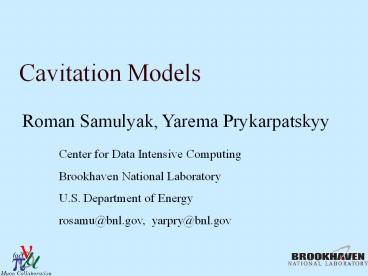Cavitation Models - PowerPoint PPT Presentation
Title:
Cavitation Models
Description:
Numerical simulation of the interaction of mercury with a proton pulse in a ... Isentropic two phase EOS model for cavitating liquid ... – PowerPoint PPT presentation
Number of Views:239
Avg rating:3.0/5.0
Title: Cavitation Models
1
Cavitation Models
Roman Samulyak, Yarema Prykarpatskyy
Center for Data Intensive Computing Brookhaven
National Laboratory U.S. Department of
Energy rosamu_at_bnl.gov, yarpry_at_bnl.gov
2
Talk outline
- Modeling of the equation of state for two-phase
fluid systems - Numerical simulation of the interaction of
mercury with a proton pulse in a thimble (BNL
AGS and CERN ISOLDE experiments) - Conclusions
- Future research
3
The system of equations of compressible
hydrodynamics
- The system is solved using the front tracking
technique for free surfaces
4
Isentropic two phase EOS model for cavitating
liquid
- Approach connect thermodynamically consistently
different models for different phases - Pure liquid is described by the stiffened
polytropic EOS model (SPEOS) - Pure vapor is described by the polytropic EOS
model (PEOS) - An analytic model is used for the mixed phase
- SPEOS and PEOS reduced to an isentrope and
connected by the model for liquid-vapor mixture - All thermodynamic functions depend only on
density
5
- The EOS
- does not take into account drag forces, viscous
and surface tension forces - does not have full thermodynamics
- Current work on improved models will be
discussed in section Future Research
6
Simulation of the Mercury SplashSchematic of
the experiment
7
Mercury splash (thimble) experimental data
Mercury splash at t 0.88, 1.25 and 7 ms after
proton impact of 3.7 e12 protons
8
Mercury splash (thimble) numerical simulation
9
Mercury splash (thimble) numerical simulation
10
Increasing the spot size of the proton beam
results in a decrease of the splash velocities
11
The splash velocity of mercury depends linearly
on the proton intensity
Numerical simulations
Approximation from experimental data
12
Conclusions
- Numerical simulations show a very good agreement
with experimental data at early time.
- The lack of full thermodynamics in the EOS leads
to some disagreements with experiments for the
time evolution of the velocity. Can be corrected
by the energy deposition.
Experimental data on the evolution of the
explosion velocity (from Adrian Fabichs thesis)
- Equation of states needs additional physics
(better mechanism of mass transfer, surface
tension, viscosity etc.)
13
Future Research
- Further work on the EOS modeling for cavitating
and bubbly flows. - a) Direct method study a liquid-vapor gas
mixture as a system of one phase domains
separated by free surfaces using FronTiers code
interface tracking capability
a)
b)
c) Direct numerical simulation of
the pressure wave propagation in a bubbly liquid
a) initial density red mercury, blue gas
bubbles, b) initial pressure the pressure is
500 bar at the top and 1 bar at the bottom, c)
pressure distribution at time 100 microseconds
pressure is 6 bar at the bottom.
Future problem develop a nonlocal Riemann solver
for the propagation of free interfaces which
takes into account the mass transfer due to phase
transitions
14
- b) Homogeneous method use a continuous
description of the liquid-vapor gas mixture by
means of homogeneous equation of state models and
the Rayleigh-Plesset equation for the average gas
bubble size evolution
Future problem include terms describing the
mass transfer due to phase transitions
15
- Further studies of the muon collider target
issues. Studies of the cavitation phenomena in a
magnetic field. - Studies of hydrodynamic aspects of the
cavitation induced erosion in the SNS target.































